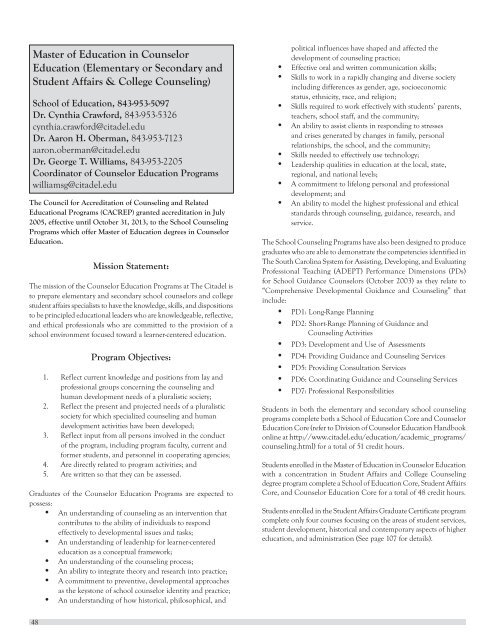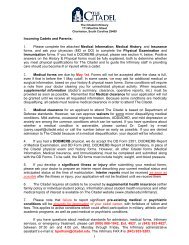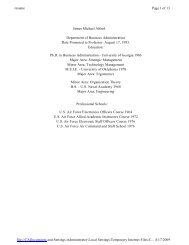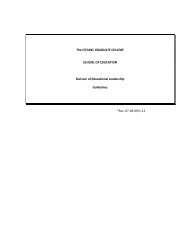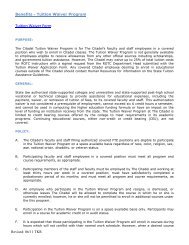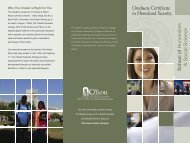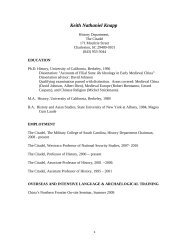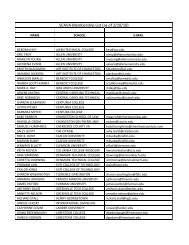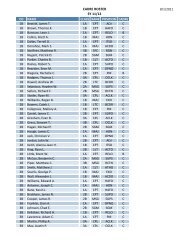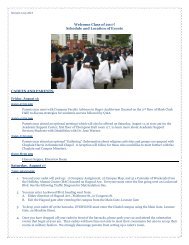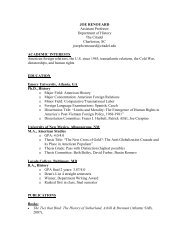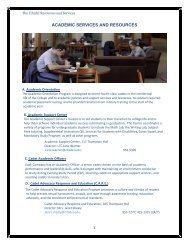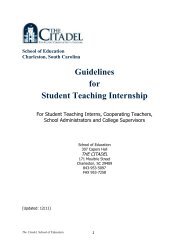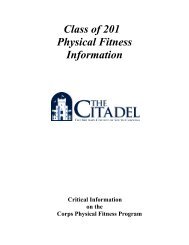2010-2011 Catalog: PDF Format - The Citadel
2010-2011 Catalog: PDF Format - The Citadel
2010-2011 Catalog: PDF Format - The Citadel
Create successful ePaper yourself
Turn your PDF publications into a flip-book with our unique Google optimized e-Paper software.
Master of Education in Counselor<br />
Education (Elementary or Secondary and<br />
Student Affairs & College Counseling)<br />
School of Education, 843-953-5097<br />
Dr. Cynthia Crawford, 843-953-5326<br />
cynthia.crawford@citadel.edu<br />
Dr. Aaron H. Oberman, 843-953-7123<br />
aaron.oberman@citadel.edu<br />
Dr. George T. Williams, 843-953-2205<br />
Coordinator of Counselor Education Programs<br />
williamsg@citadel.edu<br />
<strong>The</strong> Council for Accreditation of Counseling and Related<br />
Educational Programs (CACREP) granted accreditation in July<br />
2005, effective until October 31, 2013, to the School Counseling<br />
Programs which offer Master of Education degrees in Counselor<br />
Education.<br />
Mission Statement:<br />
<strong>The</strong> mission of the Counselor Education Programs at <strong>The</strong> <strong>Citadel</strong> is<br />
to prepare elementary and secondary school counselors and college<br />
student affairs specialists to have the knowledge, skills, and dispositions<br />
to be principled educational leaders who are knowledgeable, reflective,<br />
and ethical professionals who are committed to the provision of a<br />
school environment focused toward a learner-centered education.<br />
Program Objectives:<br />
1. Reflect current knowledge and positions from lay and<br />
professional groups concerning the counseling and<br />
human development needs of a pluralistic society;<br />
2. Reflect the present and projected needs of a pluralistic<br />
society for which specialized counseling and human<br />
development activities have been developed;<br />
3. Reflect input from all persons involved in the conduct<br />
of the program, including program faculty, current and<br />
former students, and personnel in cooperating agencies;<br />
4. Are directly related to program activities; and<br />
5. Are written so that they can be assessed.<br />
Graduates of the Counselor Education Programs are expected to<br />
possess:<br />
• An understanding of counseling as an intervention that<br />
contributes to the ability of individuals to respond<br />
effectively to developmental issues and tasks;<br />
• An understanding of leadership for learner-centered<br />
education as a conceptual framework;<br />
• An understanding of the counseling process;<br />
• An ability to integrate theory and research into practice;<br />
• A commitment to preventive, developmental approaches<br />
as the keystone of school counselor identity and practice;<br />
• An understanding of how historical, philosophical, and<br />
political influences have shaped and affected the<br />
development of counseling practice;<br />
• Effective oral and written communication skills;<br />
• Skills to work in a rapidly changing and diverse society<br />
including differences as gender, age, socioeconomic<br />
status, ethnicity, race, and religion;<br />
• Skills required to work effectively with students’ parents,<br />
teachers, school staff, and the community;<br />
• An ability to assist clients in responding to stresses<br />
and crises generated by changes in family, personal<br />
relationships, the school, and the community;<br />
• Skills needed to effectively use technology;<br />
• Leadership qualities in education at the local, state,<br />
regional, and national levels;<br />
• A commitment to lifelong personal and professional<br />
development; and<br />
• An ability to model the highest professional and ethical<br />
standards through counseling, guidance, research, and<br />
service.<br />
<strong>The</strong> School Counseling Programs have also been designed to produce<br />
graduates who are able to demonstrate the competencies identified in<br />
<strong>The</strong> South Carolina System for Assisting, Developing, and Evaluating<br />
Professional Teaching (ADEPT) Performance Dimensions (PDs)<br />
for School Guidance Counselors (October 2003) as they relate to<br />
“Comprehensive Developmental Guidance and Counseling” that<br />
include:<br />
• PD1: Long-Range Planning<br />
• PD2: Short-Range Planning of Guidance and<br />
Counseling Activities<br />
• PD3: Development and Use of Assessments<br />
• PD4: Providing Guidance and Counseling Services<br />
• PD5: Providing Consultation Services<br />
• PD6: Coordinating Guidance and Counseling Services<br />
• PD7: Professional Responsibilities<br />
Students in both the elementary and secondary school counseling<br />
programs complete both a School of Education Core and Counselor<br />
Education Core (refer to Division of Counselor Education Handbook<br />
online at http://www.citadel.edu/education/academic_programs/<br />
counseling.html) for a total of 51 credit hours.<br />
Students enrolled in the Master of Education in Counselor Education<br />
with a concentration in Student Affairs and College Counseling<br />
degree program complete a School of Education Core, Student Affairs<br />
Core, and Counselor Education Core for a total of 48 credit hours.<br />
Students enrolled in the Student Affairs Graduate Certificate program<br />
complete only four courses focusing on the areas of student services,<br />
student development, historical and contemporary aspects of higher<br />
education, and administration (See page 107 for details).<br />
48


